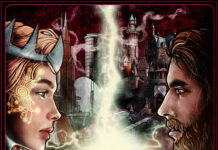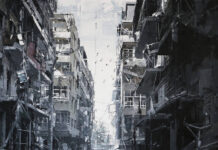Italian Gothic doom masters SHORES OF NULL are about to release their fourth full-length “The Loss of Beauty,” on March 24th, 2023, via Spikerot Records. Our expectations are quite high, as their previous album “Beyond the Shores (On Death and Dying),” was widely praised for its unconventional structure (it is a single 38-minute track) and the presence of very special guests, hence following such a majestic opus is no easy task. Here is the thing: “The Loss of Beauty” was composed and recorded between 2017 and 2019, before “Beyond the Shores,” so while technically it does not represent “the next chapter,” it is nevertheless a comeback in a more conventional sense. However, the album title is some sort of a consequence of “Beyond the Shores,” as “mourned the loss of beauty” is one of its lyric’s lines, so the two albums are deeply connected in a chronologically traditional way as well.

The eleven tunes, plus two bonus tracks that can be found on the digital and CD versions, go deep into the concept of transience of beauty in its many shapes, and the chance to find beauty in imperfections; enjoying its ephemeralness, as melancholic as it can be, requires a deeper and more genuine approach that we tend to lose the more we grow up. The lyrics are mainly based on and inspired by the Japanese concept of wabi-sabi, which can be loosely described as the enjoyment of beauty as imperfect, impermanent, and incomplete.
The central role of melody is, by now, a crucial component of the band’s trademark sound: starting from instrumental opening tune “Transitory,” guitars create a multilayered structure where every single note conveys a feeling of melancholy that can be both heavy and comforting. It is worth pointing out that an instrumental tune is SHORES OF NULL’s standard way to introduce the listeners to the journey they are about to begin, in fact both “Quiescence“ and “Black Drapes for Tomorrow” have short instrumental tunes as openers.
A journey-related feeling is also given by the following tune’s title, “Destination Woe,” whose straightforward guitar-work and solid rhythm section are the perfect environment for Davide Straccione’s epic and heartfelt chant. A combination of harmonized clean vocals (part of the band’s trademark sound from the very beginning) and deep yet classy growls build a gloomy, yet energetic soundscape infused with a sense of bittersweet Gothic-like nostalgia. A clear reference to childhood and multiple failures leave nothing unsaid but also give the listeners the chance to get involved in the narrative. This is an ever-present feature in SHORES OF NULL’s works: their ability to “talk” to their audience is impressive, as if there was a one-on-one exchange happening. This is, in my opinion, one of the ultimate functions of art, where artists end up reflecting a collective feeling and deliver their message in a universal language anyone could understand and relate to.
A strong emotional impact is detectable in the third tune, “Last Flower”: the intro melody is slightly reminiscent of SWALLOW THE SUN’s classic tunes, but it evolves into a full-fledged proof of SHORES OF NULL’s unmistakable mark. Its vocal line is reminiscent of SENTENCED and the strongly descriptive lyrics are among the most representative of the album’s main topic: “every joy is ephemeral,” as a reminder that nothing lasts forever, but again, there is an uplifting feeling of hope that eventually prevails, no matter what. The equilibrium between light and darkness, metaphorically speaking, takes a new shape in SHORES OF NULL’s songwriting style, as their personal taste in delivering melancholic melodies is always counterbalanced with a general positive attitude, as also stated in the album’s main theme.
Proof of this feature can also be found in “Darkness Won’t Take Me,” where the enjoyment of solitude is described as a comforting state of mind: “Loneliness will guide me, clinging on to grace…” An overall rockish vibe in the tune really makes it stand out, as much as a vague ‘90s flavor reminiscent of R.E.M., but also of early ANATHEMA. The first single that was published from this album was “Nothing Left to Burn,” whose video did not go unnoticed: there is again the keen eye of SandaMovies behind it and it is worth pointing out that their videos are, to all effects, an essential element of the opus. The tune is fairly epic and doomy, slow-paced and massively influenced by MY DYING BRIDE, although the band’s signature is still prominently displayed. A faster pace characterizes “Old Scars,” whose unpredictable pattern and unconventional vocal line caught me off guard: it is the most energetic tune on the album and its catchy chorus is one of the band’s entire production’s highlights, in my humble opinion.
Interlude “The First Son” sees guests Paolo Campitelli on piano and Fabio Gabbianelli on double bass (both have been playing on the band’s previous album): it is a short instrumental tune about fatherhood, where the cry of a baby (guitarist Raffaele Colace‘s first child) and an intense combination of these two instruments provide a brief change of perspective, since such a crucial moment in a man’s life is unquestionably meaningful and scary at the same time.
The sound of guitars on “A Nature in Disguise” seems to come from afar, later joined by a sustained drum-pace and a deeply felt chant that tells a story about the intricate relationship between humankind and nature. Some merciless screams provided by Selvans make things sound more extreme, and the tune turns out to be one of the most varied on the album, with some ‘80s-flavored features and even a black metal infused part.
Following tune “My Darkest Years” is the ultimate proof of frontman’s ability to turn somebody else’s tale into poignant lyrics; he took inspiration from a story that guitarist Raffaele got told by his grandfather, who was taken prisoner in Russia during WWII but managed to escape, and eventually was helped by a woman in Greece who fed him and gave him a shelter. He went back to his hometown but never forgot the horror of the war nor the help he received. The whole thing is majestically displayed in a video made by Underroom Studio. The song itself is very intense on an emotional level, thanks to powerful riffs, a great rhythm section provided by Matteo Capozucca and Emiliano Cantiano, and a perfect balance of cleans, harmonized vocals, and growls. A glimpse of hope is what saved the protagonist from certain death and, in the end, led him back home, with a broken soul and the scars, as a reminder of that tragic experience.
A vague “Viking” vibe characterizes “Fading as One” especially in the guitars and the growling part, but its epicness has many nuances, as much as its underlying melancholic atmosphere.
“A New Death is Born” shows a great balance between melody and aggressiveness, as its inner variety makes it one of the (many) highlights of “The Loss of Beauty,” giving the album a proper conclusion. “Time heals nothing, time means nothing”: death is once again the main actor in the play that eventually gets passionately called into question. It is a perfect closing tune, but it makes sense to briefly mention the two bonus tracks too.
“Underwater Oddity,” despite a vaguely prog intro, shows an unexpected pop-rock approach in its main melody, but eventually evolves into a full-fledged Gothic-doom tune, slightly reminiscent of NOVEMBRE‘s early releases. It is not the best tune on this album, but it surely gives an idea of the versatile creativity of the two composers and guitarists, Raffaele and Gabriele Giaccari. Closer “Blazing Sunlight” is a short instrumental tune whose title is also derived from the lyrics of “Beyond the Shores” and it is profoundly connected to it on many levels: just like in “Beyond the Shores,” there is the sound of the wind blowing as a background, and both the piano melody and the general atmosphere wink at that album. It is indeed an interesting way for SHORES OF NULL to conclude their new release and it gives a comforting feeling of continuity as a result.
If “Beyond the Shores (On Death and Dying)” granted them the status of Masters of the Genre, with “The Loss of Beauty” we cannot help but acknowledge their unquestionable talent for creating stunning beauty that goes under your skin, both with music and words. Stendhal syndrome does occur with music as well and this album definitely proves it. I just realized that I made the same comparison when reviewing their debut album. Well, that cannot be a mere coincidence, so… give it a listen and enjoy beauty through imperfections.
Written by Licia Mapelli
Tracklist
- Transitory
- Destination Woe
- The Last Flower
- Darkness Won’t Take Me
- Nothing Left To Burn
- Old Scars
- The First Son
- A Nature In Disguise
- My Darkest Years
- Fading As One
- A New Death Is Born
- Underwater Oddity (bonus track)
- Blazing Sunligh (bonus track)
Lineup
Davide Straccione – vocals
Gabriele Giaccari – guitars
Raffaele Colace – guitars
Matteo Capozucca – bass
Emiliano Cantiano – drums
Label
Spikerot Records





